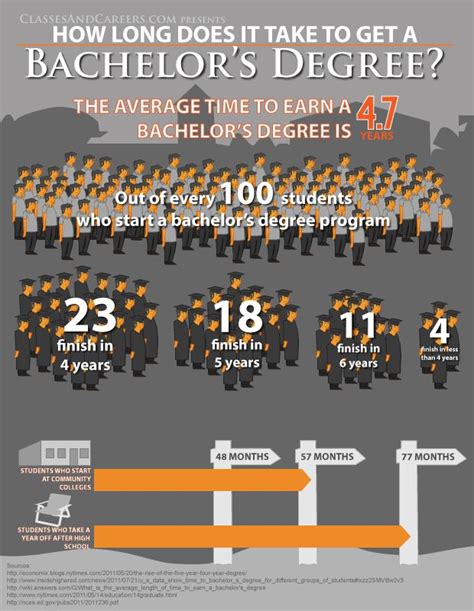How Long Does It Take to Get a Bachelor's Degree?
The question of how long it takes to earn a bachelor's degree is a common one, and the answer isn't always straightforward. While the standard timeframe is four years, several factors can influence the actual duration. This comprehensive guide will explore the variables affecting completion time and provide strategies for accelerating your journey to graduation.
The Typical Timeframe: Four Years
A traditional bachelor's degree program is designed to be completed within four years of full-time study. This assumes you're taking a standard course load of around 15 credit hours per semester and maintaining satisfactory academic progress. This structure allows for a balanced academic experience, incorporating general education requirements, major-specific coursework, and potentially electives.
Factors Affecting Completion Time
Several factors can significantly impact the time it takes to earn your degree:
1. Full-Time vs. Part-Time Study
Full-time students typically complete their degrees faster. Part-time enrollment allows for greater flexibility but extends the overall timeline, potentially taking five, six, or even more years. This is a crucial consideration based on your individual circumstances and commitments.
2. Course Load
Taking a heavier course load per semester can shorten your graduation timeline. However, remember that a heavier load can impact your academic performance if not managed effectively. Balance is key.
3. Transfer Credits
Students transferring credits from previous college coursework, Advanced Placement (AP) exams, or International Baccalaureate (IB) exams can significantly reduce their overall time to graduation. Researching transfer credit policies at your target institution is crucial before enrollment.
4. Academic Performance
Maintaining a strong GPA and avoiding academic probation can keep you on track for timely graduation. Consistent effort and effective study habits are essential.
5. Major Requirements
Some majors are more demanding than others, requiring more coursework or specialized training. STEM fields, for example, often involve more rigorous coursework and lab components, potentially slightly lengthening the completion time.
6. Summer Courses
Taking courses during the summer sessions can compress the overall timeline and allow for faster degree completion. This requires careful planning and consideration of your workload and personal life.
7. Gaps in Education
Taking breaks from your studies can, unsurprisingly, lengthen the time it takes to earn your degree. While life circumstances might necessitate these breaks, plan carefully to minimize their impact on your graduation timeline.
Strategies for Faster Graduation
Several strategies can help expedite your degree completion:
- Strategic Course Selection: Plan your courses meticulously, ensuring efficient progression through required coursework.
- Effective Time Management: Develop strong organizational and time management skills to balance academics and personal responsibilities.
- Utilize Academic Resources: Take advantage of tutoring services, academic advisors, and campus resources to maximize your academic success.
- Summer Courses: Actively consider summer coursework to accelerate your progress.
- Independent Study: Explore independent study options to potentially fulfill course requirements more quickly.
Conclusion
While a four-year timeline is typical for earning a bachelor's degree, individual experiences vary. Understanding the factors that influence completion time and adopting effective strategies can empower you to achieve your academic goals efficiently and effectively. Remember that careful planning and proactive engagement with your academic program are key to successful and timely graduation.
